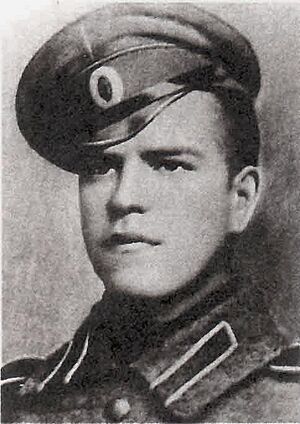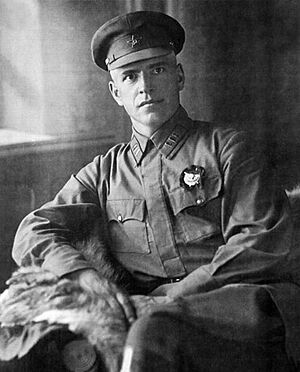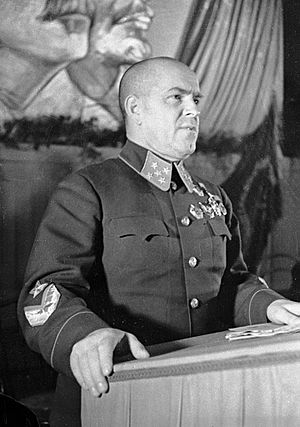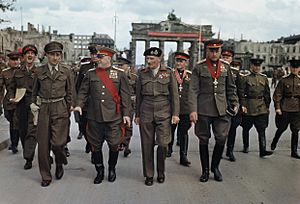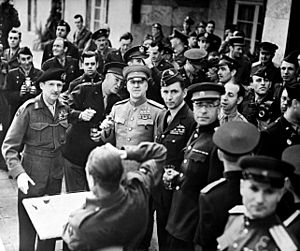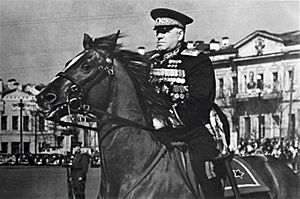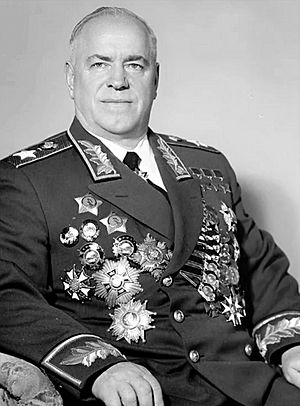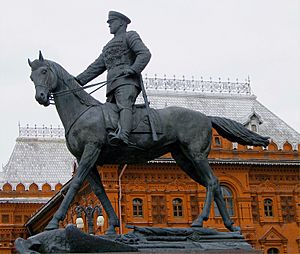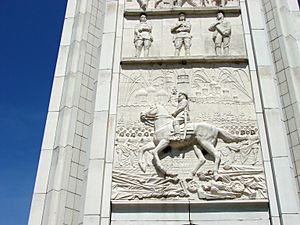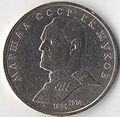Georgy Zhukov facts for kids
Quick facts for kids
Marshal of the Soviet Union
Georgy Zhukov
|
|||||||||||||||||||||||||
|---|---|---|---|---|---|---|---|---|---|---|---|---|---|---|---|---|---|---|---|---|---|---|---|---|---|
| Георгий Жуков | |||||||||||||||||||||||||
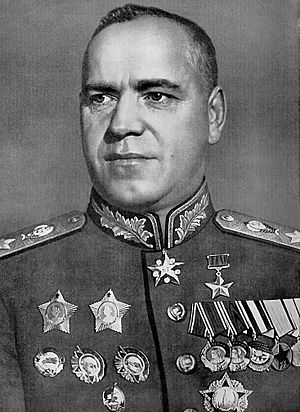
Zhukov in 1944
|
|||||||||||||||||||||||||
| Minister of Defence of the Union of Soviet Socialist Republics |
|||||||||||||||||||||||||
| In office 9 February 1955 – 26 October 1957 |
|||||||||||||||||||||||||
| First Secretary | Nikita Khrushchev | ||||||||||||||||||||||||
| Preceded by | Nikolai Bulganin | ||||||||||||||||||||||||
| Succeeded by | Rodion Malinovsky | ||||||||||||||||||||||||
|
|||||||||||||||||||||||||
| Personal details | |||||||||||||||||||||||||
| Born |
Georgy Konstantinovich Zhukov
1 December 1896 Strelkovka, Kaluga Governorate, Russian Empire |
||||||||||||||||||||||||
| Died | 18 June 1974 (aged 77) Moscow, Russian SFSR, Soviet Union |
||||||||||||||||||||||||
| Resting place | Kremlin Wall Necropolis, Moscow | ||||||||||||||||||||||||
| Nationality | Russian | ||||||||||||||||||||||||
| Political party | CPSU (1917–1957) | ||||||||||||||||||||||||
| Spouses |
Alexandra Zuikova
(m. 1953; div. 1965)Galina Semyonova
(m. 1965; died 1973) |
||||||||||||||||||||||||
| Children | Margarita and 3 others | ||||||||||||||||||||||||
| Awards |
|
||||||||||||||||||||||||
| Signature |  |
||||||||||||||||||||||||
| Nickname | Marshal of Victory | ||||||||||||||||||||||||
| Military service | |||||||||||||||||||||||||
| Allegiance | |||||||||||||||||||||||||
| Branch | |||||||||||||||||||||||||
| Service years | 1914–1957 | ||||||||||||||||||||||||
| Rank | Marshal of the Soviet Union (1943–1957) | ||||||||||||||||||||||||
| Commands |
List of commands
Kiev Military District
Odessa Military District First Belorussian Front Leningrad Front Soviet Reserve Front Soviet Western Front |
||||||||||||||||||||||||
| Wars |
Brusilov Offensive (1916)
Spring Offensive (1919)
Tambov Rebellion (1920) Soviet–Japanese conflict
Battle of Brody (1941)
Yelnya Offensive (1941) Battle of Moscow (1941) Battle of Stalingrad (1942) Operation Uranus (1942) Operation Mars (1942) Operation Iskra (1943) Operation Polar Star (1943) Battle of Kursk (1943) Operation Bagration (1944) Baltic Offensive (1944) Vistula–Oder Offensive (1945) Battle of Berlin (1945) |
||||||||||||||||||||||||
Georgy Konstantinovich Zhukov (Russian: Георгий Константинович Жуков; born December 1, 1896 – died June 18, 1974) was a very important military leader in the Soviet Union. He became a Marshal of the Soviet Union, which is the highest military rank. He also held important government jobs, like Minister of Defence.
During World War II, Zhukov led the Red Army to many big wins. He was born into a poor family in Russia and joined the army. He fought in World War I and the Russian Civil War. By 1939, he was a commander and won a key battle against Japanese forces. This victory earned him his first "Hero of the Soviet Union" award.
In 1941, Germany invaded the Soviet Union. Zhukov helped organize the defense of major cities like Leningrad, Moscow, and Stalingrad. He also helped plan big attacks like the Battle of Kursk and Operation Bagration. In 1945, Zhukov led the attack on Berlin, which ended World War II in Europe. He was chosen to accept Germany's surrender.
After the war, Zhukov was very popular. This made Joseph Stalin, the Soviet leader, see him as a possible rival. So, Stalin removed him from his top jobs. After Stalin died in 1953, Zhukov supported Nikita Khrushchev to become the new leader. Zhukov became Defence Minister in 1955. But in 1957, he lost favor again and had to retire. He never returned to power and passed away in 1974.
Contents
Early Life and Military Start
Zhukov was born in a small village called Strelkovka in western Russia. His family was very poor. His father was a shoemaker, and his mother worked as a farmer. Zhukov was said to be strong like his mother. She could carry heavy sacks of grain.
Most poor children at that time only went to school for two years. But Zhukov finished three years of primary school. After that, he became an apprentice to his uncle, who was a furrier in Moscow.
While working, Zhukov kept learning. He read books with his cousin about many subjects, like languages, science, and math. He also went to night school when he could. By 1914, he had his own fur business with three young workers.
Fighting in World War I
In 1914, Zhukov joined the Imperial Russian Army. He fought in World War I and was injured in a battle against the Germans. He showed great bravery and was given the Cross of St. George twice. He was also promoted to a non-commissioned officer.
After the 1917 October Revolution, he joined the Bolshevik Party. Being from a poor family helped him in the party. After getting better from an illness, he fought in the Russian Civil War. He became an officer in 1920. He earned the Order of the Red Banner for helping to stop a rebellion in 1921.
Between the World Wars
Zhukov quickly moved up the ranks in the army. He commanded cavalry units. In 1923, he became the commander of the 39th Cavalry Regiment. He also went to special cavalry schools and graduated in 1925. In 1929, he attended the Frunze Military Academy, a top military school, and finished in 1930.
His career grew faster during a time called the Great Purge. Many officers were removed or imprisoned. But Zhukov, who was connected to a famous cavalry army, was protected. By 1937, he was commanding larger cavalry units.
The Battle of Khalkhin Gol
In 1938, Zhukov was sent to command a Soviet-Mongolian army group. They faced the Japanese army near the border of Mongolia and a Japanese-controlled area called Manchukuo. This conflict lasted from 1938 to 1939. It started as a small border fight but grew into a full-scale war.
The most important battle was the Battle of Khalkhin Gol. Zhukov asked for many more troops. On August 20, 1939, his Soviet attack began. After a huge artillery bombardment, nearly 500 tanks moved forward. They were supported by over 500 planes. This was the first time the Soviet Air Force used fighter-bombers in this way.
The attack looked like a normal head-on assault. But Zhukov had a clever plan. Two tank brigades were kept hidden. Then, they were ordered to go around the Japanese army on both sides. They had support from motorized artillery and infantry. This bold move surrounded the Japanese 6th Army. It also cut off their supplies. By August 31, the Japanese were defeated. The Soviets had won a clear victory.
This battle was very important. Zhukov tested new ways of fighting that he later used in World War II against the Germans. For example, he used special bridges that could go underwater. He also improved new units by adding experienced soldiers to them. This helped boost morale and training.
The battle also showed that the BT tanks needed improvements. Their engines often caught fire. This led to them being replaced with diesel engines. This experience helped in developing the T-34 tank, which was very important in World War II. After this battle, experienced soldiers were moved to newer units. This helped spread their battle knowledge.
For his victory, Zhukov was named a Hero of the Soviet Union. This battle and Zhukov's use of tanks were not well known outside the Soviet Union. But Zhukov believed Khalkhin Gol was great practice for World War II. In May 1940, Zhukov became an army general. This made him one of the top eight officers in the Red Army.
Preparing for War
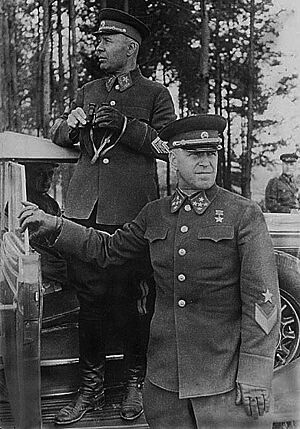
In late 1940, Zhukov began planning for the defense of the Soviet Union's western border. This border had moved further west after the Soviet Union took over parts of Poland and the Baltic countries. In his writings, Zhukov said he led the "Blue" forces in a practice war game. These were the pretend invasion troops. His opponent was General Dmitry Pavlov, who led the "Red" forces, the pretend Soviet troops.
Zhukov said the practice game was very similar to what happened later during the German invasion. On February 1, 1941, Zhukov became the chief of the Red Army's General Staff. He also became a candidate member of the Communist Party's Central Committee. In March, he was made a Deputy People's Commissar for Defence.
World War II: Leading the Soviet Army
On June 22, 1941, Germany launched Operation Barbarossa, a surprise invasion of the Soviet Union. Zhukov quickly ordered a counterattack. He wanted Soviet forces to surround and destroy the enemy. However, these early attacks failed, and many Soviet units were defeated. Zhukov later said that Joseph Stalin made him sign this order, even though he had doubts.
On July 29, Zhukov was removed from his role as chief of the general staff. He wrote that this happened because he suggested giving up the city of Kiev to avoid being surrounded. The next day, he was made commander of the Reserve Front. There, he led the Yelnya offensive, which was the Red Army's first victory against the Germans. On September 10, Zhukov became commander of the Leningrad Front. He led the defense of Leningrad.
On October 10, Zhukov took command of the Western Front. This front fought in the Battle of Moscow and other battles. In late August 1942, Zhukov became deputy commander in chief. He was sent to the southwestern front to lead the defense of Stalingrad. He and another general, Vasilevsky, planned the Stalingrad counteroffensive. In January 1943, Zhukov was promoted to Marshal of the Soviet Union.
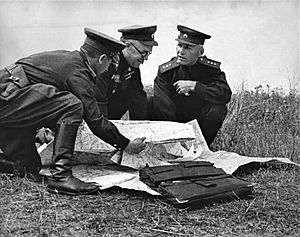
Zhukov helped coordinate the Battle of Kursk in July 1943. This was a huge tank battle. He is seen as one of the main architects of the Soviet victory there. From February 1944, Zhukov coordinated major attacks. He also commanded the 1st Ukrainian Front for a short time. During Operation Bagration, a massive Soviet attack, Zhukov coordinated several fronts.
On November 16, he became commander of the 1st Belorussian Front. This front took part in the Vistula–Oder offensive and the Battle of Berlin. He urged his troops to remember the suffering caused by the war. Over 20 million Soviet soldiers and civilians died. The war was very harsh for civilians on both sides.
Zhukov was chosen to personally accept Germany's surrender in Berlin.
After the War
Soviet Occupation Zone
After Germany surrendered, Zhukov became the first commander of the Soviet occupation zone. On June 10, 1945, he went back to Moscow to get ready for the Moscow Victory Parade of 1945. Stalin made him the commander in chief of the parade. After the parade, Zhukov returned to Berlin to continue his command.
Zhukov worked to improve life in the Soviet occupation zone. He asked the Soviet government to send large amounts of food to Berlin. He also gave strict orders to his officers. He told them to "hate Nazism but respect the German people." He wanted them to help restore normal life for the German population.
Working with Allied Leaders
From July 16 to August 2, Zhukov attended the Potsdam Conference. He met with leaders from other Allied countries. As one of the four commanders of the Allied forces, Zhukov got along well with his new colleagues. These included General Dwight D. Eisenhower from the US and Field Marshal Bernard Montgomery from the UK. They often talked about war criminals, world politics, and how to rebuild Germany.
Eisenhower and Zhukov became good friends. This helped them solve problems in the post-war period. Eisenhower's son even said Zhukov was very friendly. Zhukov and Eisenhower toured the Soviet Union together after the war. During this tour, Eisenhower introduced Zhukov to Coca-Cola. Because Coca-Cola was seen as a symbol of American influence in the Soviet Union, Zhukov didn't want to be seen drinking it. He asked if it could be made clear like vodka. So, a special clear version of Coca-Cola, called White Coke, was made for him.
Challenges in His Career
Zhukov was not only the top military commander in the Soviet occupation zone. He also became its military governor. But on April 10, 1946, he was replaced. After a difficult meeting, Zhukov was accused of being too proud and disrespectful. He was removed from his position as commander in chief of the Soviet Army.
He was then sent to command the Odessa Military District, which was far from Moscow and not very important. He arrived there on June 13, 1946. In January 1948, Zhukov had a heart attack. In February 1948, he was given another less important job, commanding the Urals Military District.
During this time, Zhukov faced challenges and accusations from some political figures. He was accused of taking items from Germany without permission. In 1948, his homes in Moscow were searched. Many valuable items were found. Zhukov admitted that he had taken some things from Germany that should have gone to the state.
In February 1953, Stalin called Zhukov back to Moscow. It was thought Zhukov's skills were needed for the Korean War. However, Zhukov received no orders from Stalin after arriving. On March 5, 1953, Stalin died. After Stalin's death, Zhukov's life changed.
Zhukov and Stalin
Zhukov was one of the few people who truly understood Stalin. As chief of staff, Zhukov had many meetings with Stalin. He learned to read Stalin's moods. For example, if Stalin smoked his pipe deeply, it meant he was in a good mood. If he couldn't light his pipe, it meant he was about to get angry. Zhukov's understanding of Stalin helped him deal with Stalin's outbursts.
Both Zhukov and Stalin could be hot-tempered. But they both made efforts to keep their relationship working. Zhukov saw Stalin as his boss. But Stalin was impressed by Zhukov and might have been a bit jealous. Stalin's military experience was from an older time. Zhukov, however, was a master of modern warfare with tanks and other machines. Their different views often led to arguments in meetings. But Zhukov was less skilled in politics than Stalin.
Zhukov was also very direct with Stalin. Many people around Stalin would flatter him. But Zhukov was stubborn and would argue. He didn't hesitate to disagree with Stalin, even if it put his career at risk. For example, they had a heated argument about whether to give up Kiev in 1941. Zhukov's ability to stick to his beliefs earned him Stalin's respect.
After Stalin's Death
Arresting Beria
After Stalin died, Zhukov became important again. He was made Deputy Defence Minister in 1953. This gave him a chance to deal with Lavrentiy Beria, a powerful and dangerous security chief. With Stalin gone, the Soviet Union faced a leadership crisis. Georgy Malenkov became the temporary leader. Malenkov and his allies wanted to reduce Stalin's influence. But Beria was still a threat. So, the politicians looked to the military for help. Nikita Khrushchev chose Zhukov because they had a good relationship. Zhukov had also helped Khrushchev before.
On June 26, 1953, a special meeting was held. Beria came to the meeting feeling uneasy. Zhukov had secretly prepared special forces. He ordered them to replace the regular guards with military guards. Finally, Khrushchev suggested removing Beria from the Communist Party and putting him on trial. Zhukov's forces arrested Beria.
Zhukov was part of the military court that tried Beria. On December 18, 1953, Beria was sentenced to death. Zhukov later said, "I considered it my duty to contribute my little part in this matter."
Becoming Minister of Defence
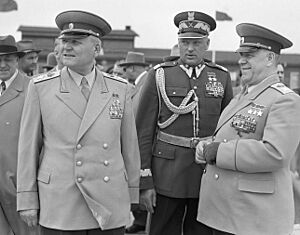
When Nikolai Bulganin became premier in 1955, he made Zhukov the Minister of Defence. Zhukov took part in many political activities. He successfully argued against bringing back the "Commissar" system, which put political leaders in charge of military decisions. He believed military commanders should have the highest power.
Until 1955, Zhukov and Eisenhower exchanged letters. Both leaders agreed that the two superpowers should live peacefully. In July 1955, Zhukov attended a big meeting in Geneva with other Soviet leaders.
Zhukov followed orders during the invasion of Hungary in 1956, after the Hungarian Revolution of 1956. He and most of the other leaders urged Khrushchev to send troops to support the Hungarian government. They also wanted to secure the Austrian border. Zhukov and others were not eager for a full-scale invasion at first. Zhukov even suggested pulling back Soviet troops.
However, the mood changed when Hungary's new Prime Minister, Imre Nagy, talked about leaving the Warsaw Pact. This led the Soviets to attack the revolutionaries. In the same years, Zhukov supported Egypt's right to defend itself during the Suez Crisis. In October 1957, Zhukov visited Yugoslavia and Albania. He tried to improve relations after a disagreement in 1948.
Losing Power Again
On his 60th birthday in 1956, Zhukov received his fourth Hero of the Soviet Union title. This made him the first person to receive this honor four times. The only other person to get it four times was Leonid Brezhnev, who was not a high-ranking military officer.
Despite not being a skilled politician, Zhukov became the highest-ranking military leader who was also a member of the Communist Party's Presidium. He became a symbol of national strength and the most respected Soviet war hero. Zhukov's popularity was even higher than the security agencies. This worried political leaders.
Zhukov wanted military agencies to report to him before the Party. He also wanted an official statement condemning Stalin's actions during the Great Purge. He supported clearing the names of many officers who had been wrongly accused. In response, his opponents accused him of being a "Reformist" and trying to become too powerful. This jealousy and hostility led to his downfall.
Zhukov's relationship with Khrushchev was strongest during the 20th Congress of the Communist Party of the Soviet Union in 1956. Khrushchev criticized Stalin's personality cult in a famous speech. To do this, Khrushchev needed the military's support, led by Zhukov.
In June 1957, Zhukov supported Khrushchev against a group that wanted to replace Khrushchev as First Secretary. At that meeting, Zhukov famously said, "The Army is against this resolution and not even a tank will leave its position without my order!" The group against Khrushchev was condemned, and Zhukov became a full member of the Presidium.
But his second fall from power was even more sudden. On October 4, 1957, he went on a trip. When he returned to Moscow on October 26, he was immediately removed from the Presidium. On November 2, he was accused of "non-party behavior" and promoting his own cult of personality. He was removed from the Central Committee and forced to retire at age 62. Many researchers believe Soviet politicians, including Khrushchev, feared powerful individuals.
Retirement and Legacy
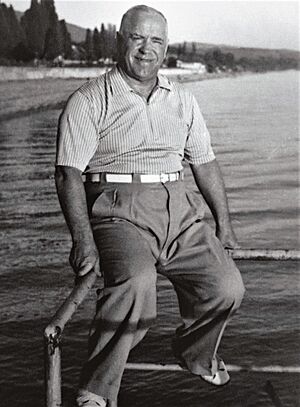
After being forced out of the government, Zhukov stayed away from politics. Many people, including former soldiers, visited him. They would go hunting and share memories. In 1959, Khrushchev told President Eisenhower that Zhukov "liked fishing." Eisenhower sent Zhukov a set of fishing gear. Zhukov liked this gift so much that he used it for the rest of his life.
After Khrushchev was removed from power in October 1964, Leonid Brezhnev brought Zhukov back into public favor. This was a way for Brezhnev to use Zhukov's popularity to strengthen his own position. Zhukov's name was mentioned publicly again. On May 9, 1965, Zhukov was invited to a special tribune and reviewed the military parade in Red Square.
Zhukov started writing his memoirs, Memories and Recollections, in 1958. He worked hard on them, but his health got worse. He had heart disease. It took another ten years for his book to be published. He often argued with Mikhail Suslov, the Communist Party's chief censor. Suslov demanded many changes, especially removing criticisms of Stalin and other leaders. Zhukov refused to exaggerate Brezhnev's role in World War II. In December 1967, Zhukov had a serious stroke. He was in the hospital for months and needed help walking and speaking.
His memoirs were published in 1969 and became a best-seller. Zhukov received over 10,000 letters from readers. The Communist Party supposedly invited Zhukov to a big meeting in 1971, but the invitation was later taken back.
Death
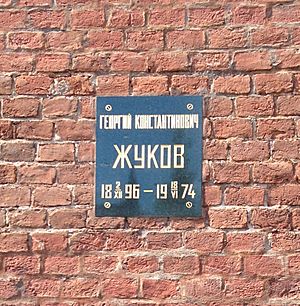
On June 18, 1974, Zhukov died after another stroke. His body was cremated. His ashes were buried at the Kremlin Wall Necropolis in Moscow. This is where many important Soviet generals and marshals are buried.
In 1995, a statue of Zhukov on horseback was put up in front of the State Historical Museum in Moscow.
Family
- Konstantin Artemyevich Zhukov (1851–1921); his father, a shoemaker
- Ustinina Artemievna Zhukova (1866–1944); his mother, a farmer
- Maria Kostantinovna Zhukova (1894-1954); his sister
- Alexei Konstantinovich Zhukov (born 1901); his brother, died young
- Alexandra Dievna Zuikova (1900–1967); his first wife
- Galina Alexandrovna Semyonova (1926–1973); his second wife
- Era Zhukova (born 1928); his daughter
- Margarita Zhukova (1929–2010); his daughter
- Ella Zhukova (1937–2010); his daughter
- Maria Zhukova (born 1957); his daughter
Remembering Georgy Zhukov
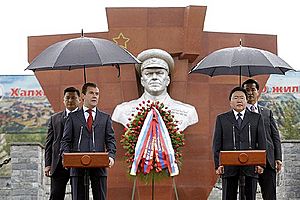
The first monument to Georgy Zhukov was built in Mongolia. It honored his victory at the Battle of Khalkin Gol. Even after the Soviet Union broke apart, this monument remained.
There is a famous statue of Zhukov on horseback in Moscow's Manezhnaya Square. It shows him as he appeared at the 1945 victory parade. Other statues of Zhukov can be found in different Russian cities.
A minor planet, 2132 Zhukov, discovered in 1975, is named after him. In 1996, Russia created the Order of Zhukov and the Zhukov Medal. These awards celebrate his 100th birthday.
Many people have written about Zhukov. The poet Joseph Brodsky wrote a poem about his death. Aleksandr Solzhenitsyn also wrote about Zhukov's memoirs.
Opinions on Zhukov's career vary. Some historians say he exaggerated his own role in World War II. For example, Marshal Konstantin Rokossovsky said that Zhukov was not involved in the planning of the Battle of Kursk. He claimed Zhukov only arrived just before the battle and left soon after.
However, Zhukov also received many positive comments. His fellow soldiers, the modern Russian Army, and Allied leaders praised him. General of the Army Dwight D. Eisenhower said that the world owed Zhukov a lot for his fight against the Nazis. He called Zhukov a modest person. Eisenhower believed there should be an award named after Zhukov to honor his bravery and vision.
Marshal of the Soviet Union Aleksandr Vasilevsky called Zhukov one of the most outstanding military commanders. Major General Sir Francis de Guingand, a British officer, described Zhukov as friendly. John Gunther, who met Zhukov many times, said he was more friendly and honest than other Soviet leaders.
John Eisenhower, Dwight Eisenhower's son, said Zhukov was very lively and a friend. Albert Axell, in his book "Marshal Zhukov, the one who beat Hitler," called Zhukov a military genius like Alexander the Great and Napoleon. Axell also said Zhukov was a loyal communist and a patriot. Otto Chaney, who wrote about Zhukov, concluded that Zhukov belongs to everyone. He said Zhukov's strength and determination helped win World War II. He remains a symbol of victory.
In Russia, Zhukov is often remembered for a "prophetic" comment he made in 1945. He told Konstantin Rokossovsky, "We have liberated them, and they will never forgive us for that."
Awards and Honors
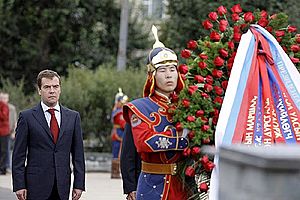
Zhukov received many awards. He was awarded the Hero of the Soviet Union four times. Only one other person, Leonid Brezhnev, received this honor four times. Zhukov was also one of only three people to receive the Order of Victory twice. He also received high honors from many other countries.
Awards from Imperial Russia
| Cross of St. George, 3rd class |
| Cross of St. George, 4th class |
Awards from the Soviet Union
| Hero of the Soviet Union (awarded four times: 1940, 1944, 1945, 1956) |
| Order of Victory (awarded twice: 1944, 1945) |
| Order of Lenin (awarded six times: 1936, 1939, 1945, 1956, 1966, 1971) |
| Order of the October Revolution (1968) |
| Order of the Red Banner (awarded three times: 1922, 1944, 1949) |
| Order of Suvorov, 1st class (awarded twice: 1943) |
| Medal "For the Defence of Stalingrad" |
| Medal "For the Defence of Leningrad" |
| Medal "For the Defence of the Caucasus" |
| Medal "For the Defence of Moscow" |
| Medal "For the Liberation of Warsaw" |
| Medal "For the Capture of Berlin" |
| Medal "For the Victory over Germany in the Great Patriotic War 1941–1945" |
| Medal "For the Victory over Japan" |
| Jubilee Medal "Twenty Years of Victory in the Great Patriotic War 1941-1945" |
| Jubilee Medal "XX Years of the Workers' and Peasants' Red Army" |
| Jubilee Medal "30 Years of the Soviet Army and Navy" |
| Jubilee Medal "40 Years of the Armed Forces of the USSR" |
| Jubilee Medal "50 Years of the Armed Forces of the USSR" |
| Jubilee Medal "In Commemoration of the 100th Anniversary of the Birth of Vladimir Ilyich Lenin" |
| Medal "In Commemoration of the 250th Anniversary of Leningrad" |
| Medal "In Commemoration of the 800th Anniversary of Moscow" |
| Honorary weapon – a sword with a golden Soviet emblem |
Awards from Other Countries
| Hero of the Mongolian People's Republic (Mongolian People's Republic, 1969) |
| Order of Sukhbaatar (Mongolian People's Republic, awarded three times: 1968, 1969, 1971) |
| Order of the Red Banner (Mongolian People's Republic, awarded twice: 1939, 1942) |
| Medal "30 Years of the Victory in Khalkhin-Gol" (Mongolian People's Republic) |
| Medal "50 Years of the Mongolian People's Revolution" (Mongolian People's Republic) |
| Medal "For Victory over Japan" (Mongolian People's Republic) |
| Medal "50 Years of the Mongolian People's Army" (Mongolian People's Republic) |
| Order of the White Lion, 1st class (Czechoslovakia) |
| Military Order of the White Lion, 1st class (Czechoslovakia) |
| War Cross 1939–1945 (Czechoslovakia) |
| Virtuti Militari, 1st class (Poland) |
| Order of Polonia Restituta, 1st class (Poland) |
| Order of Polonia Restituta, 3rd class (Poland) |
| Cross of Grunwald, 1st class (Poland) |
| Medal "For Warsaw 1939–1945" (Poland) |
| Medal "For Oder, Neisse and the Baltic" (Poland) |
| Medal "25 Years of the Bulgarian People's Army" (Bulgaria) |
| Medal "90th Anniversary of the Birth of Georgi Dimitrov" (Bulgaria) |
| Garibaldi Partisan Star (Italy, 1956) |
| Grand Cross of the Order of Merit (Egypt, 1956) |
| Grand Officer of the Legion d'Honneur (France, 1945) |
| Croix de guerre (France, 1945) |
| Honorary Knight Grand Cross, Order of the Bath, (military division) (UK, 1945) |
| Chief Commander, Legion of Merit (United States, 1946) |
| Presidential Medal of Freedom, with distinction, (United States, 1969) |
| Order of Freedom (Yugoslavia, 1956) |
| Medal of Sino-Soviet Friendship (China, awarded twice: 1953 and 1956) |
Images for kids
See also
 In Spanish: Gueorgui Zhúkov para niños
In Spanish: Gueorgui Zhúkov para niños
 | Sharif Bey |
 | Hale Woodruff |
 | Richmond Barthé |
 | Purvis Young |


